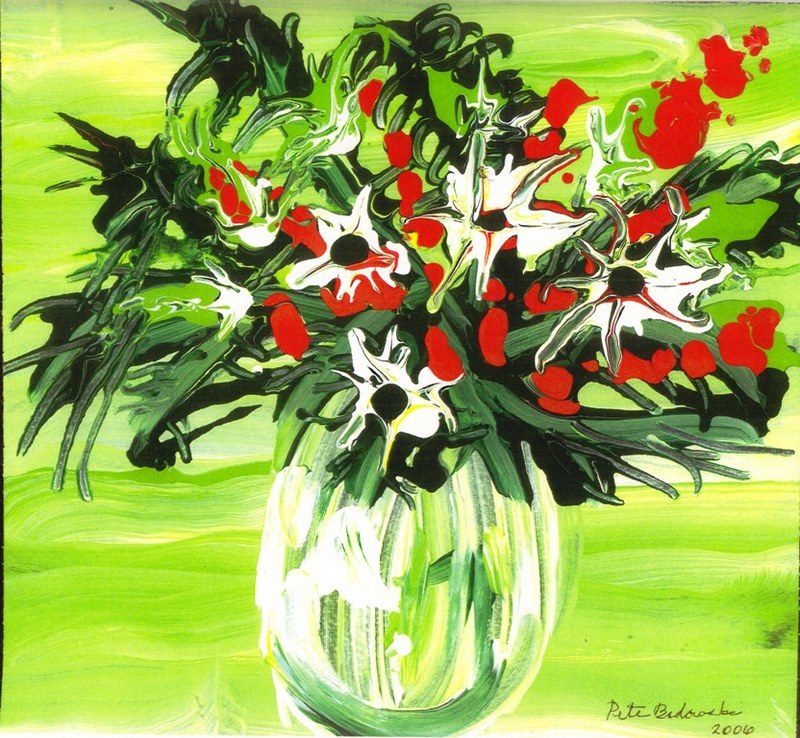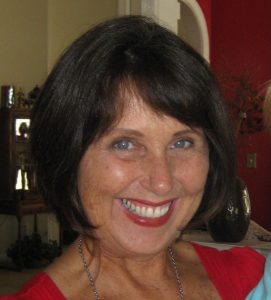When Marjorie Hilkert’s mother called her to let her know her father had painted a picture, Hilkert wasn’t fazed.
“I said something like, ‘Oh that’s nice mom,” Hilkert recalls. Her father was in his 80s, living in Florida and suffering from Alzheimer’s disease. While in Florida, he attended an adult daycare program where he was exposed to Memories in the Making, an Alzheimer’s Association program that allows people with Alzheimer’s disease or other dementia to express themselves through art.
A few months after her mother’s phone call, Hilkert went to visit her father and saw his creations for herself.
“It was incredible. I’ve never worked with somebody who had quite the dramatic results that my father had,” Hilkert said. Her father had grown up in poverty, had a 10th grade education and worked in a factory for much of his life; he had no formal arts education, yet the flowers that he painted—which looked like the ones in his wife’s garden—were beautiful.
It was then that Hilkert, who was living in Williamsburg, Virginia, and was at the time a long-distance caregiver for her father, turned to art as a means of helping Alzheimer’s patients feel more alive in their battle against the disease, gain more self-esteem, find a productive outlet for emotions, tune in to lost memories and socialize with others.
“It’s taken a very sad thing, a terrible disease, and for our family, it’s turned it into a passion and a legacy that my dad left,” Hilkert explains.
Her father, who has since passed away, created 12 paintings in all, and Hilkert’s family had them made into cards which they gave away in exchange for donations to the Alzheimer’s Association. To date, they have raised about $8,000 that way.
Hilkert began educating others about her father’s artwork and was eventually invited to be a keynote speaker at an assisted living and memory care center in Richmond, Virginia, by a woman that started Memories in the Making in California.
Hilkert was then trained to be a certified Memories in the Making facilitator, and shortly after her training, she began going to assistant memory care units in Williamsburg and facilitating six-week programs.
She, along with several volunteers, comes into the care unit for an hour each week laden with all kinds of art supplies, from crayons and watercolors to magazines and clay. She often pays for these herself, receives art supply donations or the facilities provide materials.
She begins with a theme—travel, childhood or perhaps holidays—and she asks the residents, most of whom are in the early to middle stages of Alzheimer’s, when they are still able to perform daily functions unassisted—about times in their lives where they can relate to the topic.
Each week, they work in different mediums: collages, watercolors, clay and more, and at the end of six weeks, Hilkert holds an art show, invites the residents’ families and displays the artwork in the care unit.
She asks each of the residents to share the story of their creation, and when they’re finished, everyone claps.
“This sometimes gives me chills,” says Hilkert. “For that moment, they’ve created something they never thought they would have created and they’re getting accolades for this. It never ceases to give me such a warm feeling.”
She spends her days doing this to give people suffering with memory loss a chance to feel successful at something, to maintain their dignity, their sense of importance, when everything else has been stripped away.
“We’d like to give them a chance to feel pride and accomplishment in something and a sense of belonging in a group,” she says.
There’s even science to back up the idea that art is good for the Alzheimer’s soul: studies show the right side of the brain, the one responsible for creativity, is the last area to be affected by the disease, which means even if Alzheimer’s patients have lost their verbal skills, they are still able to express themselves creatively in other ways.
After holding programs for three years, Hilkert started holding trainings to teach others how to facilitate programs. She now holds a few one-day trainings each year at the Williamsburg Regional Library.
To learn more about Memories in the Making, visit the Alzheimer’s Association website. For information on facilitator trainings in Williamsburg, email Marjorie Hilkert at marjoriehilkert@yahoo.com or call 703-582-4245.








